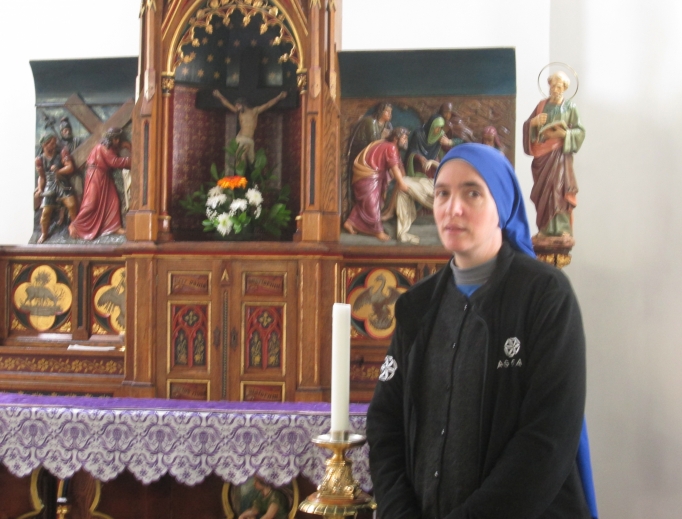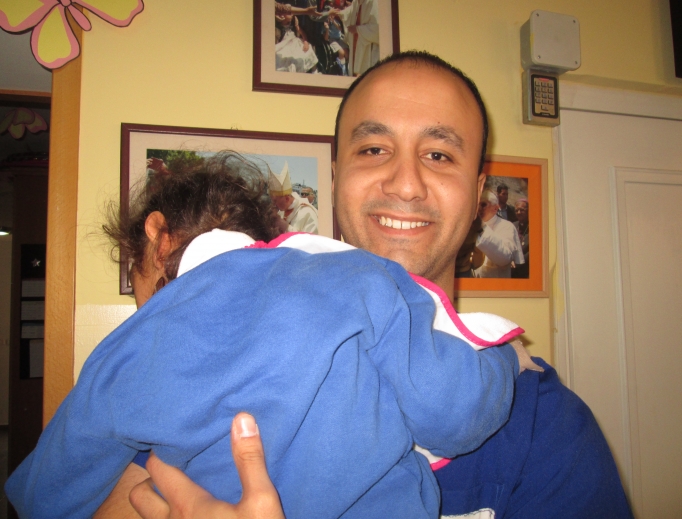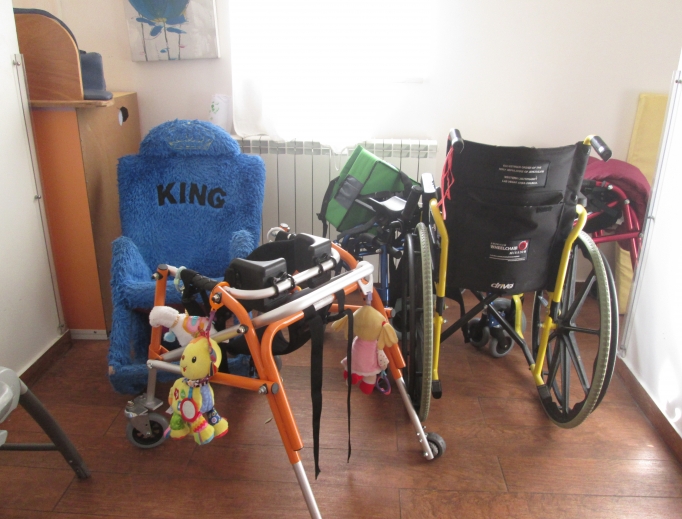The Spirit of Jesus: Religious Community Serves Special Children in Christ’s Birthplace
The Nino Dios home in Bethlehem cares for 36 Palestinian children with severe disabilities.

BETHLEHEM, West Bank — Christmas is a very special time in this West Bank town, the birthplace of Jesus. Pilgrims flock to Manger Square, where a Christmas tree towers over the annual holiday market and hand-carved olivewood Nativity scenes grace store windows.
Around the corner, the residents who live at the Nino Dios home for special children are also celebrating Christ’s birth with Christmas decorations, special outings and visits from local schoolchildren. But while the magic of Christmas peaks at the home during the holiday season, the spirit of Jesus is evident there 365 days a year.
The home was established in 2005 by the Religious Family of the Incarnate Word, a missionary family of nuns, priests and laypeople dedicated to witnessing Jesus’ love for all people and helping families accept and love all children, whether they be healthy or ill, as a gift from God. Those who serve in Bethlehem strive to be a bridge between Muslims and Christians, who comprise less than 2% of the Palestinian population.
Nino Dios is home to 36 Palestinian children with complex permanent disabilities. Many were abandoned by their families or lived with families who could not care for them due to extreme poverty; others were removed from homes deemed unsafe by Palestinian authorities.
In 2011 the home was relocated to a modern stone building owned by the Latin Patriarchate of Jerusalem. Fittingly, it sits just behind the Church of the Nativity, built at the site where Jesus was born.
On a warm Friday morning bright sunshine flowed through the building’s many large windows, and the home — like the children themselves — was immaculately clean and well cared for. During music hour in one of the classrooms, the children who were ambulatory danced, while staffers and volunteers swayed to the music, cradling some of the children who aren’t. Laughter filled the room.
The facility was founded just as the second Palestinian intifada was drawing to a close.
The Religious Family “saw an urgency to start a welcoming home for children who were handicapped, abandoned or in grave need in the Bethlehem area,” said Sister Maria Pia Carbajal of the Religious Family of the Incarnate Word, who served as the superior in Bethlehem from 2007 to June 2019.
Today the home serves children from all across the West Bank, including Ramallah and Hebron. The youngest residents are 2 years old.
“They are like a family. Many may live here their entire lives,” said Sister Maria di Roncesualles, who became the home’s superior when Sister Pia was called to serve in the Israeli city of Tel Aviv-Jaffa. “They have very severe mental and/or physical disabilities. Some have Down syndrome; some have autism, cerebral palsy, various genetic syndromes.”

Although some of the children are ambulatory, others use wheelchairs custom-designed for their needs. Several are nonverbal but can communicate with devices or with their eyes and smiles.
Thanks to the five nuns, therapists and a rotating roster of volunteers who work at the home, all of the residents receive individualized physical therapy and speech therapy and are taught in small groups appropriate to their developmental level. Priests see to the sisters’ spiritual needs.
“Some people reject special children and ask why we have a school here, insisting the residents cannot learn,” Sister Pia said, referring to some segments of Palestinian society that believe disabled people lack the potential to learn and thrive. “Through our testimony we are trying to change that mentality, to show that disabled people are like us, but with different capabilities.”
Majd Hawash, a pediatric physical therapist who works at Nino Dios, believes all children should receive the care needed to reach their potential, whatever that may be.
“First of all, when I see a child, I assess him to know his physical abilities. If he can’t sit up, I give him exercises to strengthen his muscles and improve his balance. If he can stand but can’t walk, I work with him to take his first steps.”
The fact that most of the children have more than one disability makes the work more challenging, Hawash said, but no less rewarding.


“I believe in God and that these children are a gift,” said Hawash, who is Greek Orthodox. “While studying to become a physical therapist I visited many facilities, and I have never seen a place like Nino Dios. It’s bright, it’s sunny, it’s clean, and the sisters do an amazing job. They love the children. They bring them to doctors and make sure that the children who need them receive expensive tests and expensive equipment,” from sophisticated wheelchairs to walkers. “Working here has taught me patience and to never complain about the small nuisances in life.”
Maria, who worked in finance in Spain and asked that her last name not be published, decided to quit her job and fly to the Middle East to volunteer at Nino Dios through the Christian nongovernmental organization Youth Wake Up!
“I decided that it was time to start taking care of other people and not just myself,” Maria, who is 26, said.
She acknowledged that the work, and living in a very different culture, is difficult at times. The lack of hot water in her rented apartment (volunteers pay their own way) and the social mores that prohibit a single woman from going out at night in Bethlehem have also been challenging, she said.
Nor was Maria prepared for the severity of the residents’ disabilities.
“The first day I arrived here I was shocked, but then one of the children gave me a big hug, and I knew I was in the right place. We change diapers, shower and feed the children, but when you see the children’s smiles, all the difficulties disappear.”
Maria said volunteering at the home has changed her priorities and strengthened her Catholic faith.
“I value my life more and am super thankful for all that I have. I’m certain that I want to adopt a child with special needs.”
Before coming to Bethlehem and working with the children, Maria struggled with her relationship with God.
“When I came here I saw that every person is a child of God. I can see this through the children,” she said.
Walking briskly through the sprawling building, which includes a beautiful chapel and a spacious garden, Sister Maria apologized for the huge racks that held the children’s wet bedsheets.
“We have only one dryer, and we need to dry the children’s clothes,” she noted. “In the summer the laundry dries quickly. Now, not so much.”
The home relies on charitable donations and the kindness of others.
While she would welcome a second dryer, Sister Maria said she is more concerned about the new small home for special children that is being readied nearby for pre-teen and teenage boys. They will need everything from kitchen appliances to beds and blankets.
“Some don’t understand how we can build without having all the money,” Sister Maria said, “but for children in need, the money arrives, step by step. Even 10 euros here and there can pay for food and medicine. I trust in God. He is the master.”
Michele Chabin is the Register’s Middle East correspondent.
She writes from Jerusalem.
MORE INFORMATION
Email: [email protected]
















